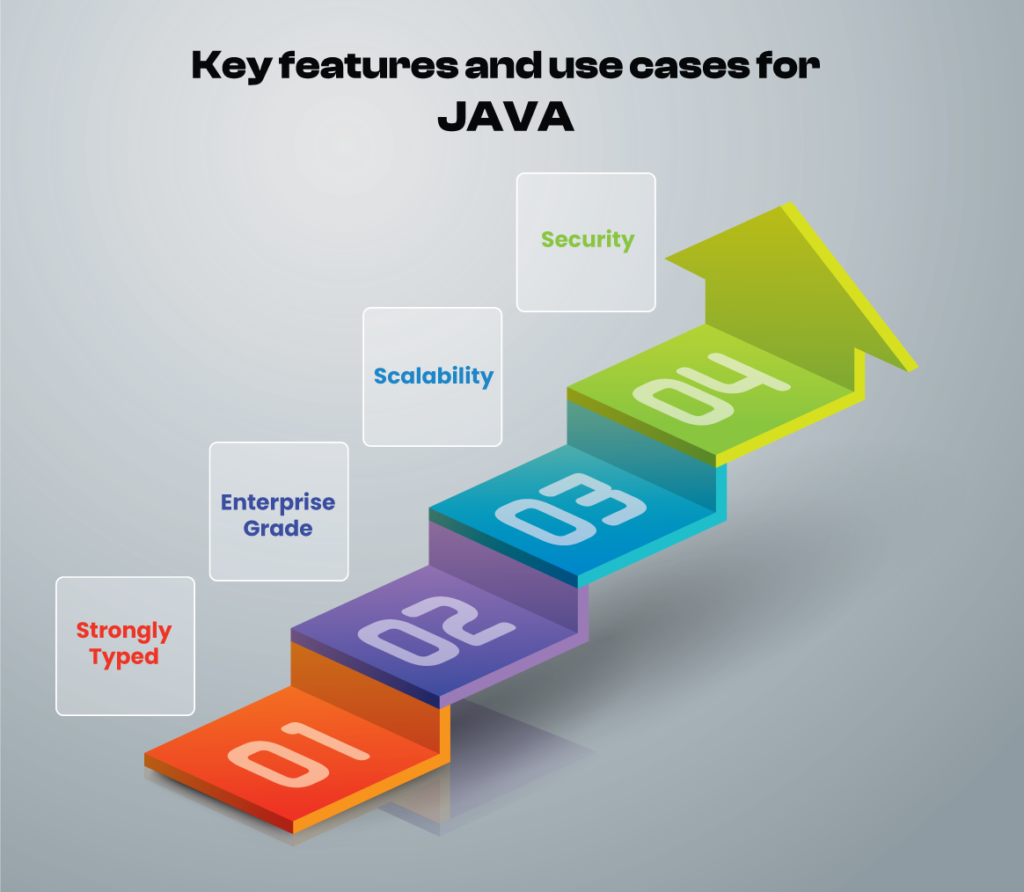
A Comprehensive Guide to the Difference Between Java vs AngularJS
When it comes to web development, there may regularly be exceptional confusion regarding the contribution of different technologies. Java and Angular are two famous names in international development, however, they serve quite distinctive purposes. In this comprehensive guide, we will discover the key differences between Java vs AngularJS, helping you understand when and the way to use each one.
Java: The Versatile Language
Java is an excessive-level, object-oriented, and platform-impartial programming language. It was created by Sun Microsystems and is thought of for its “write once, run anywhere” solution. Java is mainly used for server-side programming and is frequently employed for building web programs, mobile apps (Android), and more.

Here are a few key features and use cases for Java:
Platform Independence: Java enterprise application can be run on any platform with a Java Virtual Machine (JVM), making it compatible with cross-platform languages.
Strongly Typed: Java is statically typed, which means that you must claim the kind of variable before the use of it, improving code reliability.
Enterprise-Grade: Java is widely used in organization programs, monetary structures, eCommerce websites, and large-scale, undertaking-vital software programs.
Scalability: Java is known for its scalability, making it suitable for constructing strong, high-traffic programs.
Security: Java has a strong emphasis on security with features just like the Security Manager and libraries to prevent commonplace security vulnerabilities.
Angular: The Front-End Framework
Alternatively, Angular is a front-end framework for constructing dynamic and responsive web applications. It is developed and maintained with the aid of Google and is written in TypeScript, a statically typed superset of JavaScript. Angular affords a structured and modular way to build complex single-page-applications (SPAs).

Here are a few key functions and use instances for Angular:
Single-Page Applications: Angular is mainly well-acceptable for constructing SPAs, wherein content is dynamically loaded without page refresh.
Modularity: Angular encourages using components, offerings, and modules, making code extra maintainable and testable.
TypeScript: Angular leverages TypeScript, which adds static typing and robust tooling to JavaScript, enhancing excellent code and developer productivity.
Two-Way Data Binding: Angular’s information binding talents simplify the synchronization of information between the version and the view.
Dependency Injection: Angular gives a powerful dependency injection machine, taking into consideration the easy control of dependencies in an application.
Key Differences between Java vs AngularJS
Angular highlight the important thing differences between the Java vs AngularJS:
Purpose: Java is on the whole a server-facet language, while Angular is the front-end framework for constructing patron-side web applications.
Language: Java web application development company offers statically typed language. On the other hand, Angular is the front-end framework written in TypeScript, which is a statically typed superset of JavaScript.
Platform: Java web applications run on a JVM and are platform-independent, at the same time as Angular applications run in web browsers and are platform-agnostic.
Development: Java applications are historically built using Integrated Development Environments (IDEs) like Eclipse or IntelliJ IDEA, whilst Angular applications may evolve with code editors like Visual Studio Code.
Usage: Java is used for an extensive variety of programs, such as web, mobile, and computer. Angular is in most cases used for net software development.
Community and Ecosystem: Java enterprise application development has many processes and steps to go through. Java developers follow these steps to build a user-friendly web application for your business.
Java enterprise web applications offer extensive libraries and frameworks, whereas Angular has a specific ecosystem for front-end development, together with its set of libraries and extensions.
Java and Angular serve different purposes in the global of software application development. Java is a flexible, platform-unbiased language used for server-side and multi-platform development, while Angular is a front-end framework tailored for building modern web applications.
Understanding these key differences will assist you in picking the right era for your assignment, whether you are building a robust backend system with Java or creating a dynamic user interface with Angular.
What are the challenging areas of JavaScript?
JavaScript is a versatile and extensively used programming language; however, it also gives developers several hard regions.
Some of the maximum not unusual demanding situations in JavaScript development includes:
Asynchronous Programming: JavaScript is frequently used for obligations like coping with consumer input, making community requests, and dealing with animations.
These responsibilities are asynchronous and work with callbacks, guarantees, and async/watch be challenging, particularly for the ones new to the language.
Scoping and Closures: Best Java development companies make use of feature-rich libraries, which ensure reduction of sudden closure of the web applications effectively. Managing variable scope and information on how closures work is critical for writing code.
Type Coercion: JavaScript’s free typing device can result in unexpected effects while data types are used together. Understanding type coercion and how to work around it is essential for writing reliable code.
Event Handling: Handling events in the browser, which include consumer interactions like clicks and keypresses, may be complicated. Managing event listeners, event propagation, and handling event objects can be tough.
This Keyword: The conduct of this keyword in JavaScript may be difficult, especially in distinct contexts like item methods, callbacks, and constructors. Developers regularly struggle with expertise when this refers to the right context.
Prototypal Inheritance: JavaScript uses prototypal inheritance, which isn’t like classical inheritance in languages like Java or C++. Understanding how to work with prototypes and create object hierarchies can be challenging.
Callback Hell (Pyramid of Doom): When handling deeply nested callbacks, it could lead to a structure known as “Callback Hell” or the “Pyramid of Doom.” This makes the code tough to study and hold. Promises and async/anticipate have helped mitigate this problem.
Cross-Browser Compatibility: Ensuring that JavaScript code works continuously across unique net browsers can be tough because of browser-specific quirks and functions. Developers often want to write code that handles cross-browser inconsistencies.
Memory Management: JavaScript is a garbage-collected language, but knowledge of how memory is controlled and the way to save memory leaks is crucial for building web applications.
Security: Security is a massive problem while running with JavaScript, especially at the consumer’s face. Developers should be aware of unusual safety vulnerabilities along with Cross-Site Scripting (XSS) and Cross-Site Request Forgery (CSRF).
Tooling: JavaScript development often entails a big selection of tools, libraries, and frameworks, making it difficult to select the proper ones and configure them properly. Build, application deal managers, and testing frameworks are vital, however, it may be complex to set up and use successfully.
Performance Optimization: Writing JavaScript code and optimizing for pace and reminiscence usage may be hard. Understanding overall performance bottlenecks and using profiling equipment is necessary for enhancing performance.
While those challenges may appear concerning, there are additional possibilities for boom and studying. With practice and terrific information on JavaScript’s basics, builders can overcome these challenges and turn out to be proficient in the language.
Additionally, there are numerous online assets, courses, and communities available to choose from. Also, you can hire dedicated java developer teams that can help you navigate problems and usually enhance JavaScript competencies.

What are the top advantages of using Java web applications for your business?
Java is a popular choice for building web applications due to the wide range of benefits it offers to its users.
Here are some of the top advantages of the use of Java for web applications:
Why do developers prefer to use Java web applications?
Platform Independence: Java programs are platform-impartial, thanks to the “Write Once, Run Anywhere” (WORA) philosophy. This method that a Java web application advanced on one platform and can run on any platform that has a Java Virtual Machine (JVM) without amendment.
Robustness and Reliability: Java is understood for its strong type checking and exception-handling features, which makes it reliable. This facilitates growing stable and error-loose net programs.
Scalability: Java web applications can easily scale to meet growing call for. Java’s assist for multi-threading and distributed computing allows you to address a big range of concurrent users and data.
Performance: Java’s Just-In-Time (JIT) compilation and other optimization techniques help in reaching high performance. Java programs can be optimized to deliver speedy execution.
Security: Java gives integrated protection features, which include a security manager and a sandboxing mechanism that allows defend against malicious code. This is important for constructing stable web applications.
Rich Ecosystem: Java has a sizable atmosphere of libraries and frameworks that may be used to streamline net utility improvement. Popular Java net frameworks like Spring, Java Server Faces (JSF), and Struts simplify the development method.
Community and Support: Java has a big and energetic developer network. This means there are abundant assets, documentation, and network assist available to help with web software development.
Enterprise-Ready: Java is regularly considered an enterprise-stage era. It’s nicely applicable for huge-scale, complicated applications. Many massive groups use Java for building web applications.
Compatibility and Longevity: Java applications generally tend to have a protracted life cycle. This is because Java has backward compatibility, ensuring that older Java applications continue to run on more recent versions of the language.
Object-Oriented Programming: Java is an item-oriented language, which encourages the use of smooth and modular code, making it simpler to hold and expand web applications.
Database Connectivity: Java gives strong database connectivity through technologies like JDBC (Java Database Connectivity), allowing you to engage with diverse database structures.
Portability: With Java, you can develop web applications on one platform and deploy them on another without main changes, making it less complicated to goal exclusive environments.
Mature Technology: Java has been around for a long time and is a mature technology with a validated tune file for net improvement.
While Java gives many benefits, it’s critical to be aware that the choice for web development needs to be taken into consideration the particular requirements of the goal and the know-how of the development team.
Concluding Thoughts
Top custom Java software development company in India is a widespread-reason programming language that has a strong presence in various domains, consisting of backend development, Android app development, and large-scale organization.
The recognition of Java remains extensive; however, it could, however, be as visibly outstanding in web development as Angular.
Angular’s popularity inside the context of net development can be attributed to its unique cognizance of front-end development, its suitability for cutting-edge web software paradigms, Google’s assist, TypeScript integration, and its robust community and environment.
Java’s popularity is maintained in a kind domain name, and the choice between Java vs AngularJS depends on the type of project you are choosing.
FAQs
Which is a better language: Java vs AngularJS?
Angular has been the most feature-rich front-end framework since its inception. It can be compared to the ASP.NET in C# or the Spring Framework for Java. All the tools required to develop your application are included in it.
Which is Easier, Java vs AngularJS?
Both languages seem easier to use. However, as the code for Java is written once and runs everywhere, it becomes easier for developers to build web applications swiftly.
Is Java with Angular in demand?
The most popular and in-demand were found to be ReactJS and ASP.NET Core. According to the report, Angular’s popularity among developers has decreased, but its demand still outpaces its supply.
The recently published State of JavaScript 2022 report also revealed that Angular is becoming less and less popular among developers.

